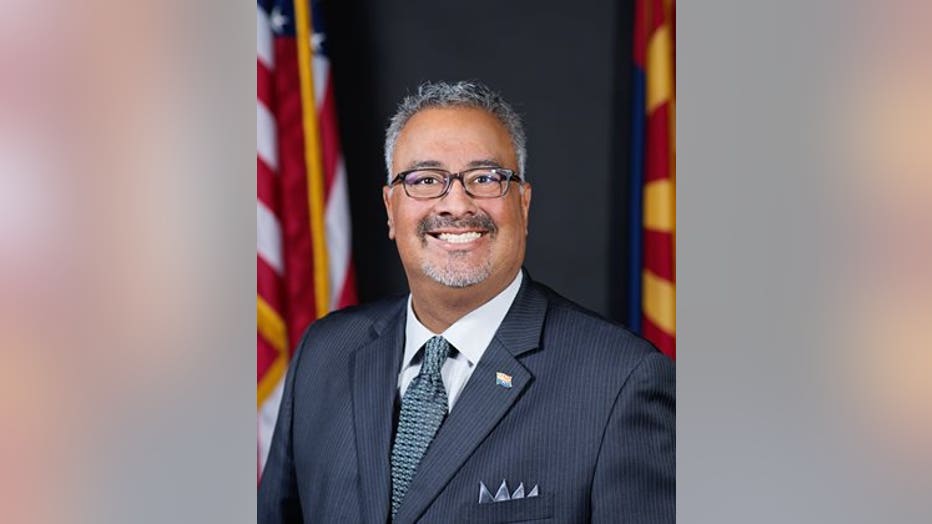Wife: Arizona Rep. Lorenzo Sierra still in critical condition after COVID-19 diagnosis
BALTIMORE - The wife of Arizona Rep. Lorenzo Sierra says her husband is showing "early signs of improvement" after he was hospitalized for complications related to COVID-19.
According to a news release from the Arizona House Democrats, Sierra was admitted to a Washington, D.C. hospital on the night of Oct. 4. Sierra was then transferred to The Johns Hopkins Hospital in Baltimore on the morning of Oct. 5 where he is intubated and resting comfortably in the ICU.
"Despite taking extensive precautions at all times, they somehow became infected," read a statement in the news release. "They wish to remind everyone that COVID-19 is highly contagious and remains a very real public health concern."

Arizona Rep. Lorenzo Sierra has been hospitalized with complications related to COVID-19. (City of Avondale)
State Rep. Sierra, who lives in Avondale and represents Arizona Legislative District 19, was visiting family in Washington, D.C. with his wife, Rhonda Cagle, when both began exhibiting symptoms of COVID-19.
State Rep. Sierra and Cagle tested negative for the virus before traveling.
"He remains in critical, stable condition on a ventilator at Johns Hopkins due to COVID19. I have consented to an experimental treatment to give him every opportunity to recover from this terrible disease," wrote Cagle, in a tweet made on Oct. 6. "Please pray."
State Rep. Sierra is the third Arizona lawmaker to be diagnosed with COVID-19. More than 100 state lawmakers nationwide have tested positive for the disease and three have died.
“Arizona’s prayers are with Representative Sierra and his wife, Rhonda, as they battle COVID-19,” Gov. Doug Ducey wrote on Twitter. “We are thinking of them and their entire family.”
This story was reported from Phoenix.
The Associated Press contributed to this story.
In order to protect yourself from a possible infection, the CDC recommends:
- Avoid close contact with people who are sick.
- Avoid touching your eyes, nose, and mouth.
- Stay home when you are sick.
- Cover your cough or sneeze with a tissue, then throw the tissue in the trash.
- Clean and disinfect frequently touched objects and surfaces using a regular household cleaning spray or wipe.
- Cover your mouth and nose with a cloth face cover when around others
- Wash your hands often with soap and water for at least 20 seconds, especially after going to the bathroom; before eating; and after blowing your nose, coughing, or sneezing.
- Monitor your health daily
MAP: Worldwide interactive Coronavirus case data
MAP: Arizona Coronavirus cases by zip code
FULL COVERAGE: fox10phoenix.com/coronavirus
CDC: How coronavirus spreads, symptoms, prevention, treatment, FAQ
Arizona COVID-19 resources, FAQ: azdhs.gov/coronavirus
On CoronavirusNOW.com, you'll find extensive coverage about COVID-19, including breaking news from around the country, exclusive interviews with health officials, and informative content from a variety of public health resources.
RELATED:
- Coronavirus in Arizona: Latest case numbers
- Coronavirus: Symptoms, testing and how to prepare amid growing COVID-19 outbreak
- How coronavirus differs from flu: Symptoms to watch for
Symptoms for coronavirus COVID-19 include fever, coughing, and shortness of breath. These, of course, are similar to the common cold and flu.
Expect a common cold to start out with a sore or scratchy throat, cough, runny and/or stuffy nose. Flu symptoms are more intense and usually come on suddenly, and can include a high fever.
Symptoms of COVID-19 may appear more slowly. They usually include fever, a dry cough and noticeable shortness of breath, according to the World Health Organization. A minority of cases develop pneumonia, and the disease is especially worrisome for the elderly and those with other medical problems such as high blood pressure, obesity, diabetes or heart conditions.
RELATED: Is it the flu, a cold or COVID-19? Different viruses present similar symptoms
Right now there's one big difference between flu and coronavirus: A vaccine exists to help prevent the flu and it's not too late to get it. It won't protect you from catching the coronavirus, but may put you in a better position to fight it.
To protect yourself, wash your hands well and often, keep them away from your face, and avoid crowds and standing close to people.
And if you do find yourself showing any of these flu or coronavirus symptoms - don't go straight to your doctor's office. That just risks making more people sick, officials urge. Call ahead, and ask if you need to be seen and where.
Get breaking news alerts in the FREE FOX 10 News app. Download for Apple iOS or Android.

